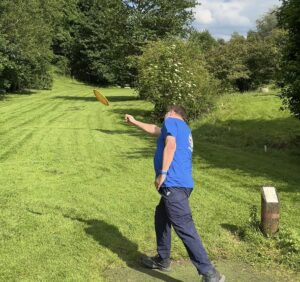Disc Golf Injury Prevention: Tips for Safe Play & Recovery

Oh, the beauty of disc golf. The thrill of that perfect throw, the frustration when the disc refuses to cooperate, and the sound of chains when you nail that putt. But just like any other sport, with great throws come great responsibilities. I’m talking about the responsibility to our bodies. After all, no one wants to sit out on a beautiful day because they’ve pushed their elbow or knee a bit too hard.
How Do You Prevent Injuries in Disc Golf?
Proper Technique is Key: Let’s start with the basics. If you’re consistently throwing with poor form, you’re not only going to see fewer birdies on your scorecard, but you’re also more likely to wind up with a strain or sprain. One might say, “It’s not the disc; it’s the thrower!” Get lessons, watch pros on YouTube, and never underestimate the value of practice. The better your form, the less likely you are to injure yourself.
Warm-up Before You Throw: Ever seen a pro athlete jump straight into a game without stretching? Neither have I. Take a few minutes before your round to get those muscles limber. A simple stretch can go a long way.
Sturdy Shoes Matter: We’ve all tried that ‘casual’ round in flip-flops, only to regret it later. Invest in a good pair of sturdy, grippy shoes. Your ankles will thank you, especially on those uneven terrains.
Watch Where You Step: Speaking of terrain, be wary of slippery surfaces or unseen obstacles. I’ve seen more injuries from a slip on the tee pad than a bad throw. Keep an eye out!
Is Disc Golf Hard on Your Body?
In the grand scope of sports, disc golf is fairly gentle. You’re not tackling anyone, there’s no high-speed ball coming at you, and trees are mostly stationary. However, the repetitive motions, especially if done incorrectly, can wear on the joints and muscles.
But let’s flip the perspective. Disc golf offers a great way to get outdoors, engage in mild cardio, and give our brains a workout with every strategic throw. When played with awareness and care, it’s much kinder on the body than many other sports.
What Arm Injuries Can You Get from Disc Golf?
- Tennis Elbow (or should we say, Disc Golf Elbow?): It’s that pain you feel on the outside of your elbow from overuse. Remember that proper technique we talked about? Here’s where it pays dividends.
- Rotator Cuff Injuries: These tiny muscles in your shoulder can take a beating with repeated, forceful throws. Strengthening and stretching exercises can help.
- Wrist Sprains: These are pretty common, especially when trying to add that extra ‘snap’ to your throw. Again, correct form is your best defense.
Is Disc Golf Hard on the Knees?
For the most part, the answer is no, unless you’re one of those brave souls who loves to jump putt from 50 feet away. The twisting motion when you pivot on your lead foot can be stressful to your knees. If you’ve got a history of knee issues, you might want to re-evaluate that part of your technique. And just like your arm, proper form and technique can save your knees a lot of grief.
Let’s Wrap It Up with a Bow (or a Disc)!
To avoid injuries in disc golf, just remember the golden rules:
- Proper technique.
- Warm-up.
- Wear good shoes.
- Stay aware of your surroundings.
And most importantly, always listen to your body. If something doesn’t feel right, don’t push it. There’ll always be another day, another course, and another chance to throw that perfect shot. But only if you’re in top shape to play.
So, next time you’re out on the course, take a moment to appreciate that marvelous game, chuckle at the inevitable rogue throws, and always play smart. After all, disc golf isn’t just about the score, it’s about the journey. And we all want that journey to be pain-free. Well, physically at least. Can’t help you with the anguish of missing that 10-foot putt!
Stay safe, play smart, and may your discs always find the chains. Except when you’re practicing injury prevention, then they can miss a few times. We’ll let it slide.








